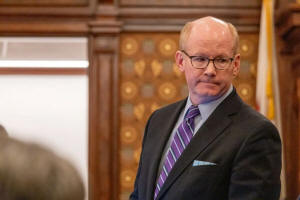Elections board deadlocks on $10M fine for Senate President Don Harmon
[October 22, 2025]
By Ben Szalinski
SPRINGFIELD – The Illinois State Board of Elections deadlocked Tuesday
on whether Senate President Don Harmon broke state election laws by
accepting millions of dollars for his campaign after the 2024 primary.
Staff at the elections board fined Harmon’s campaign $9.8 million
earlier this year following a Chicago Tribune report that Harmon
improperly accepted $4 million more than was allowed during the 2024
election.
Harmon appealed, which sent the matter to a hearing officer, who
recommended the full board let the fine stand.
But the board, made up of four appointed Republicans and four appointed
Democrats, deadlocked in a 4-4 partisan decision on Tuesday as to
whether the fine should stand.
The move created confusion among all parties, including the board’s
legal counsel, and ultimately postponed official action on the matter
until the board’s next meeting in November.
Contribution caps
The donations in question involve a state law that limits contributions
to campaigns during an election cycle. Under the law, a campaign becomes
“self-funded” when the candidate contributes or loans more than $100,000
into the campaign. Once that happens, the candidate and their opponents
are no longer subject to limits on how much people or political action
committees can contribute to the campaign.
Harmon, an Oak Park Democrat, contributed $100,001 to his own campaign
in January 2023. His lawyers argued that move should have busted the
caps until his name next appeared on the ballot, which it has not since
the Senate president made the move.

Staff at the elections board determined the move should have been good
only through the next primary election, meaning the campaign fund
improperly collected about $4 million after the 2024 primary.
Harmon appealed that fine, but a hearing officer and attorney for the
board recommended on Oct. 7 that the board should let it stand.
The 4-4 partisan vote left the board in what members described as an
“unprecedented” stalemate. Harmon’s attorney, Michael Kasper, argued the
board cannot order Harmon to pay a fine because a majority of the board
failed to approve it.
The board’s deputy general counsel, Jordan Andrew, initially said the
fine should stand because the board did not vote to accept Harmon’s
appeal. Normally, fined parties have 30 days to pay, she said.
Kasper promised to challenge any fines in Cook County Circuit Court, but
argued he wouldn’t have legal standing to file a lawsuit because a
majority of the board had not approved the fine.
After more than an hour of debate about how the board handles 4-4
decisions, it unanimously agreed to punt the issue to its November
meeting. That would allow board attorneys to research what the
appropriate next steps should be and whether Harmon’s campaign should
still be fined after a tied vote.
Time is also ticking for Harmon to resolve the case, as state law
prohibits candidates from running for office if they have unpaid fines
to the board. The board will certify the 2026 primary ballot in January
— on which Harmon’s name is expected to appear.
Harmon’s arguments
Kasper argued limits on Harmon’s fundraising should have remained off
through the 2026 election, noting the state law regulating self-funded
candidates refers only to “elections” and not “election cycles.” He said
reestablishing caps either after the 2024 primary or general election
would establish new limits on fundraising in the middle of Harmon’s
term.
[to top of second column]
|

Senate President Don Harmon, D-Oak Park, is pictured in the Illinois
Senate on May 31, 2025. (Capitol News Illinois photo by Andrew
Adams)

Kasper argued that allowing Harmon to self-fund only for a short period
in 2024 when he was not on the ballot gives him an unfair advantage to
raise unlimited amounts of money well before any challengers would have
considered running against him in 2026.
“What the legislature intended to do by creating two election cycles for
the Senate was to equalize the treatment of House candidates and Senate
candidates,” Kasper said. “That was the intention of the statute all
along.”
Though Harmon was not on the ballot in 2024, legislative leaders often
use their campaign funds to help other candidates in their caucuses with
their races, often through direct contributions or by covering expenses
for their members’ campaigns.
The board’s Democrats were sympathetic to Kasper’s arguments. Member
Jennifer Ballard Croft, a Cook County Democrat, said the legislature
created an “intentional distinction” when it referred only to
“elections” in the self-funding law.
Harmon had $16.5 million in his account as of Sept. 30, which can be
used to pay the possible fine to the elections board.
Board’s decision
Hearing officer Barbara Goodman’s recommendation pointed to six times
Harmon’s campaign correctly filed self-funding notices as evidence
Harmon was familiar with the timeframes that a candidate can remove
contribution limits. In January, for example, he lifted contributions
limits through the March 2026 primary.
“The committee (Harmon’s campaign) for the first time, either changed
its interpretation of the time period for lifting of the contribution
limits or simply chose to ignore them,” Goodman wrote in her
recommendation that the board uphold the original fine.
Illinois’ law defining the timeframes of election cycles is clear,
Goodman wrote. Cycles either begin Jan. 1 the year after a general
election and continue through the following primary election, or they
begin the day after a primary election and continue through Dec. 31 of
that year. Those cycles apply regardless of a state legislator’s term in
office, she wrote.
In Harmon’s case, that means the election cycle without fundraising
limits would have ended at the March 2024 primary and any contributions
after that should have been limited.

Goodman wrote Kasper made “interesting albeit unsupported arguments”
about the definition of election cycles, but Harmon demonstrated in
multiple other election cycles he was aware of how they are defined.
“This committee has funded and made a deliberate action to put the
$100,001 into their account to self-fund five times prior to this and I
think that shows there was an understanding of the statute as
recommended by the hearing officer or a pretty serious mistake was
made,” board Chair Laura Donahue, a Republican, said.
Capitol News Illinois is
a nonprofit, nonpartisan news service that distributes state government
coverage to hundreds of news outlets statewide. It is funded primarily
by the Illinois Press Foundation and the Robert R. McCormick Foundation. |